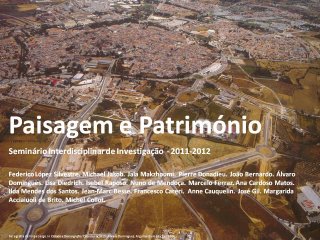Full Event
21 Oct
to
25 May
Landscape and Heritage
Interdisciplinary Seminar of Research

Organisation: Isabel Lopes Cardoso, art historian, researcher CHAIA/University of Évora
25 years ago, the UNESCO classified the historic centre of the city of Évora, the capital of Alentejo, as World Heritage. To celebrate this milestone for the city and for Portugal, the Art History and Artistic Research Centre / CHAIA of the Universityof Évoraproposes to hold an Interdisciplinary Seminar of Research about Landscape and Heritage. In this year of 2011, theUniversity ofÉvora also celebrates the 30th anniversary of the creation of the Landscape Architecture degree. With the creation of the same degree in the High Institute of Agronomy ofLisbon, the year of 1981 marks the beginning of the Landscape Architecture teaching inPortugal. This seminar will provide an opportunity to reflect on the Landscape and Heritage concepts that today are overexposed because of the huge economic issues associated with both.
The heritage concept was imposed to the general public in the turn of the 1970-1980 years. In the Western culture, in a context of profound economic and social transformations, the conservation and the transmission of the material and immaterial Heritage become a very assertive problem of memory and identity. The definitive rupture with the old rural and urban
traditions leads, for the French historian Pierre Nora, to a turning point in our concept of heritage. The loss of references marks the beginning of the “total Heritage” Age, defined by Pierre Nora as the passage of a state-owned and national heritage (inherited) to a type of social and community heritage (claimed). In other words, the Heritage left its historical Age to enter in a memory Age, in which is not dissociable of the notions of memory and identity. This “total Heritage”, around which was built a real economy based on cultural tourism, has a conceptual equivalence in the concept of "omnipaysage" described by Michael Jakob.
Today, the territory is also in fashion. Abandoned for fifty years, the landscape has been rehabilitated in the early 1980s with the questioning of the dominant progress model and its disastrous impacts on the environment. The political initiatives taken by several European countries to protect the environment have come to inspire a transnational policy and produce a
common tool, the European Landscape Convention, ratified byPortugalin 2005.
This seminar will be dedicated to the polysemy and the various representations of Landscape and Heritage. Aesthetic value, emotional value and utility value, practical reason and political, economical, technical, artistically reasons must be profoundly confronted in an interdisciplinary perspective.






